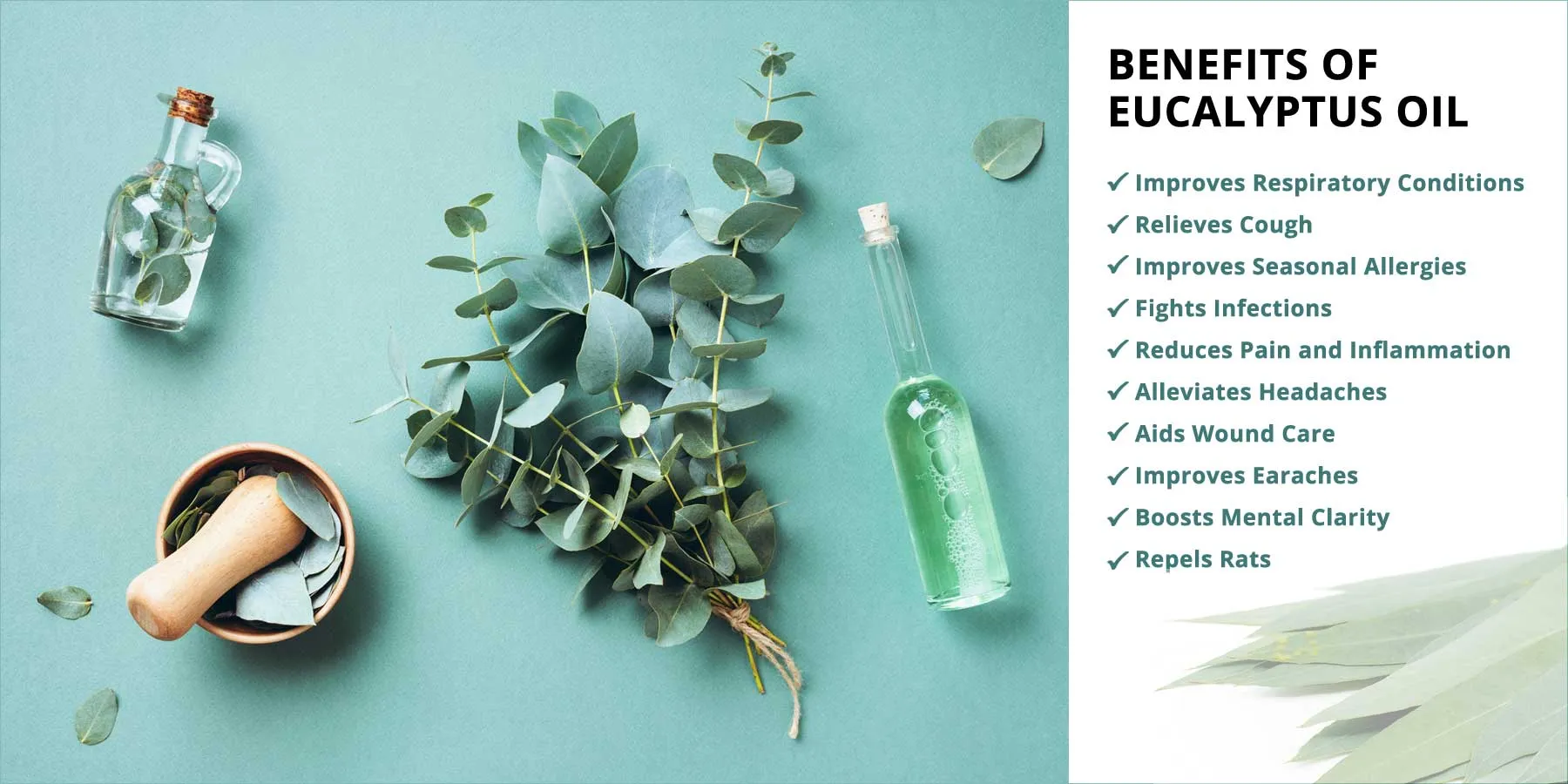Benefits and Uses of Eucalyptus Essential Oil

Researchers have found that eucalyptus Oil’s “broad-spectrum antimicrobial action make it an attractive alternative to pharmaceuticals.” This is why eucalyptus essential oil is commonly used in products to fight foreign pathogens and different forms of infections.
So, what is eucalyptus oil?
Eucalyptus oil is made from leaves of selected eucalyptus tree species. The trees belong to the plant family Myrtaceae, which is native to Australia, Tasmania and nearby islands. There are more than 500 eucalypti species, but essential oils of Eucalyptus salicifolia and Eucalyptus globulus (which is also called fever tree or gum tree) are retrieved for their medicinal properties.
Aside from extracting their essential oils, the bark of the eucalyptus tree is used for papermaking and the wood is used in Australia as fuel and timber.
Traditionally, eucalyptus oil was used as an analgesic agent that helped to relieve pain, and it was valued for its ability to reduce inflammation and improve respiratory conditions. And today, eucalyptus oil benefits and uses are extensive, and the oil is commonly used in healing ointments, perfumes, vapor rubs and cleaning products.
Eucalyptol, or 1,8-cineole, which accounts for 70–90 percent of the contents of eucalyptus oil, has antioxidant, anti-inflammatory and pain-relieving effects. Eucalyptus is also well known for its ability to fight bacterial, viral and fungal infections, and to help clear the respiratory tract of built up mucus. For these reasons, eucalyptus is definitely one of the most beneficial and versatile essential oils to keep in your medicine cabinet.
What are some of the main benefits of eucalyptus oil?

1. Improves Respiratory Conditions
Of all the essential oils, eucalyptus has been believed to be one of the most effective against a range of respiratory conditions, including chronic obstructive pulmonary disease (COPD), asthma, bronchitis, sinusitis, the common cold, cough or the flu.
Eucalyptus essential oil improves many respiratory conditions because it helps to stimulate your immune system, provide antioxidant protection and improve your respiratory circulation. Eucalyptus makes it feel easier to breathe when you’re feeling stuffed up and your nose is running because it activates your nose’s cold receptors, and it even works as a natural sore throat remedy. Plus, eucalyptus can help with sleeping when you are feeling congested and unable to breath.
Research shows that Eucalyptus globulus, of which cineole is the major active ingredient, helps to reduce the inflammatory effect of chronic bronchitis and inhibits the hypersecretion of airway mucins in animal studies.
A randomized study published in Evidence-Based Complementary and Alternative Medicine evaluated the treatment of upper respiratory tract infections using aromatic herbs. The trial was conducted in six primary care clinics in northern Israel and participants were treated with an essential oil blend that included eucalyptus, peppermint, oregano and rosemary essential oils. Those in the experimental group applied the essential oil blend as a spray five times a day for three days and compared these results to a placebo spray.
Researchers found that 20 minutes after using the spray, those in the essential oil group reported a greater improvement of symptom severity compared to those in the placebo group. The symptoms measured were sore throat, hoarseness and cough.
2. Relieves Cough
Eucalyptus oil is one of the most effective essential oils for cough because it works as an expectorant, cleansing your body of the microorganisms and toxins that are making you cough and feel lousy.
A placebo-controlled double-blind trial conducted in 2014 investigated the efficacy of cineole, one of the main components in eucalyptus oil, on patients with acute bronchitis. Patients who were administered 200 milligrams of cineole three times a day for a 10-day period experienced significant improvements of bronchitis symptoms compared to those receiving the placebo. Patients receiving cineole had significantly less cough fits after four days of treatment.
3. Improves Seasonal Allergies
Components of eucalyptus oil, such as eucalyptol and citronellal, have anti-inflammatory and immunomodulatory effects, which is why the oil is often used to relieve seasonal allergy symptoms.
An animal study published in BMC Immunology found that eucalyptus oil not only exhibits antiseptic, antimicrobial and anti-inflammatory properties, but it may also have immuno-regulatory effects. This can help to alter the immune response that occurs when the body comes into contact with an allergen.
4. Fights Infections
Several studies show that eucalyptus oil and its main component, eucalyptol, have antimicrobial effects against many strains of bacteria, viruses and fungi. (12)
Eucalyptus can be used aromatically or topically to fight the microorganisms that make you sick. This is why eucalyptus oil benefits include its ability to boost your immune system. A lab study published in the Asian Pacific Journal of Tropical Biomedicine found that eucalyptus oil displayed inhibitory effects against Escherichia coli and Staphylococcus aureus (which can cause a staph infection).
And another lab study showed that eucalyptus oil has a direct antiviral effect against herpes simplex virus, which can lead to infections including genital herpes.
Eucalyptus essential oil can also be used as an anti-fungal agent against common fungal infections like Candida and toenail fungus.
5. Reduces Pain and Inflammation
A well-researched eucalyptus oil benefit is its ability to relieve pain and reduce inflammation. When it’s used topically on the skin, eucalyptus can help to reduce muscle pain, soreness and swelling.
A randomized clinical trial published in Evidence-Based Complementary and Alternative Medicine investigated the effects of inhaling eucalyptus oil on pain and inflammatory responses after total knee replacement surgery. Patients inhaled either eucalyptus or almond oil for 30 minutes during rehabilitation on three consecutive days. Then pain, blood pressure and heart rate scores were reported. Researchers found that pain scores on all three days, and systolic and diastolic blood pressure levels on the second day were significantly lower in the eucalyptus group. This suggests that eucalyptus oil inhalation can be used as “a nursing intervention for pain relief.”
6. Alleviates Headaches
Eucalyptus oil is one of the best essential oils for headaches because it may alleviate sinus pressure that can cause a lot of pain and tension. It also has invigorating properties that can boost mental clarity and promote relaxation of tense facial muscles, which is helpful when you are suffering from a headache caused by stress or exhaustion. These results seem to be most pronounced when eucalyptus oil is combined with peppermint oil and a carrier.
A 2011 randomized study found that eucalyptus oil has anti-inflammatory and analgesic effects. It can help to inhibit the formation of mucus in the airways and improve breathing for people with respiratory conditions, which can help to reduce headache tension that’s caused by sinus pressure.
7. Aids Wound Care
I’m often asked if eucalyptus oil is good for your skin? Because of its antimicrobial and antiseptic properties, eucalyptus works as a great tool for skin irritations such as wounds, cuts, burns, sores and even insect bites.
According to a 2017 review that evaluated the use of essential oils as alternative medicine for dermatological conditions, eucalyptus oil has proven to be effective against blisters, boils, cuts, cold sores, insect bites, shingles, sores, ulcers, wounds, abscesses, athlete’s foot, and bacterial dermatitis. It has antibacterial, antiviral and antifungal properties, making it a very powerful tool against a range of skin conditions. This is why eucalyptus oil was traditionally used as a healing ointment.
8. Improves Earaches
Because eucalyptus oil works as an expectorant that helps to unclog your respiratory tract and has antimicrobial properties that help to clear up an infection that may cause fluid to build up in your ear canal, it can be used to improve ear infection symptoms and earaches.
Use eucalyptus oil to improve earaches or pain that’s caused by the common cold or cough, nasal congestion, a bacterial infection, seasonal allergies, or any other type of condition that’s causing the buildup of fluids in your ear canals.
9. Boosts Mental Clarity
Eucalyptus oil has invigorating, soothing and purifying properties, which is why it can be used to boost energy and mental clarity. It may help to clear your airways, allow more oxygen into your lungs and relieve brain fog.
A double blind, placebo-controlled, randomized crossover study that involved 32 healthy participants found that when a combination of eucalyptus oil, peppermint oil and ethanol were applied to large areas of the forehead and temples, the participants experienced increased cognitive performance. The essential oil blend also had muscle-relaxing and mentally relaxing effects.
10. Repels Rats
A 2014 study published in The Scientific World Journal suggests that eucalyptus can be used in protecting an area from house rats.
When the oil was sprayed in laboratory pens, the rats no longer consumed food in that area. In fact, researchers report that food consumption was significantly lower from the treatment side compared to the untreated side, which indicates a significant repellent effect of eucalyptus essential oil.
There have been instances of eucalyptus oil poisoning in infants and young children. It is not safe for children to swallow eucalyptus oil. If you are using eucalyptus oil on children, stick to diffusing it at home or diluting it with a carrier oil, such as coconut oil, before topical application.
References:
RELATED POSTS